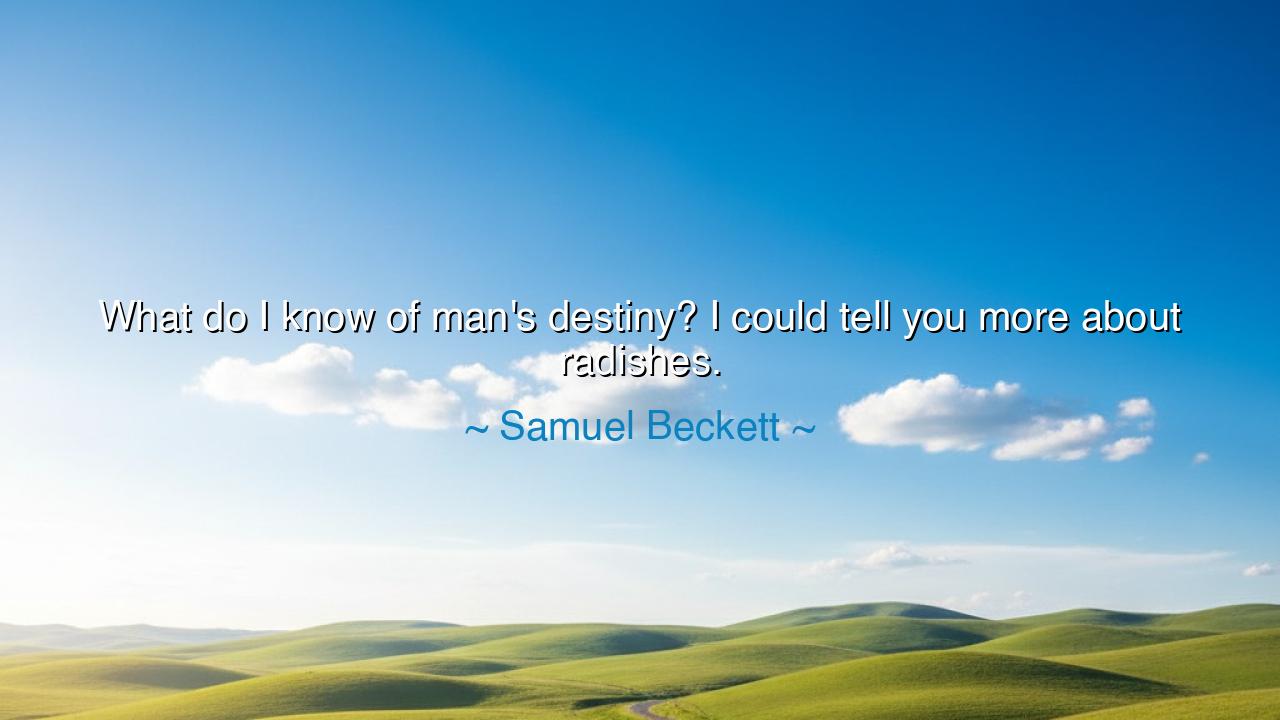
What do I know of man's destiny? I could tell you more about






“What do I know of man’s destiny? I could tell you more about radishes.” Thus spoke Samuel Beckett, the poet of absurdity, the pilgrim of silence, whose words shimmer with both irony and despair. In this strange confession lies not foolishness, but the wisdom of one who has looked deeply into the abyss of existence and found humility. For Beckett, the radish — simple, earthy, and tangible — stands in contrast to the grand and unknowable concept of man’s destiny, that eternal question which philosophers and prophets have wrestled with since time began. Through this humor cloaked in humility, Beckett teaches us that to seek the meaning of life is to confront the limits of our own knowing.
In the ancient days, sages sought to read the stars and discover the will of the gods. They built temples, crafted myths, and wrote scriptures — all in pursuit of destiny, the hidden map of mankind’s journey. Yet Beckett, born into the modern age of doubt, speaks with a different voice. He does not climb toward the heavens; he kneels toward the soil. His statement is a lament and a liberation at once: he admits that in the face of vast cosmic questions, he knows nothing — except perhaps the radish, the humble root that grows in silence, nourishes simply, and asks nothing of the universe. Thus, he rejects the illusion of ultimate knowledge and finds truth in the ordinary.
Beckett lived through wars and witnessed the unraveling of meaning in the modern world. His works — Waiting for Godot, Endgame, Krapp’s Last Tape — are not tales of heroes, but of wanderers lost in time, waiting for answers that never come. When he says, “I could tell you more about radishes,” he is not mocking wisdom; he is mocking pretension — the arrogance of man who believes he can define fate, control time, or understand the infinite. In a world that grows louder with its own certainty, Beckett stands as a voice of silence and truth, whispering that sometimes to admit ignorance is the highest form of understanding.
Consider the story of Socrates, who, centuries before Beckett, declared, “I know that I know nothing.” This was no defeat but enlightenment — for in acknowledging his ignorance, Socrates opened himself to genuine inquiry. Beckett’s words are born of the same lineage. The radish, like Socrates’ humility, becomes a symbol of grounded truth — of the small, the real, the graspable. It grows in dirt, watered by rain, nourished by what is unseen. It is a thing one can know fully, unlike destiny, which is forever hidden behind the veil of mystery. The wise man, Beckett suggests, should concern himself not with the unreachable, but with the tangible — with living simply and authentically in the moment that is given.
Yet there is tenderness in his irony. When Beckett speaks of man’s destiny, he does not reject the wonder of existence — he only rejects the vanity that seeks to master it. He tells us that to ponder destiny may be noble, but to pretend to know it is folly. For who among us can say why we are born or to what end we strive? The radish, by contrast, asks no such questions. It grows because it must; it fulfills its small purpose without complaint. In this, perhaps, lies Beckett’s quiet answer: that our destiny is not to understand, but to endure, to create, to grow — like the radish, patiently and without despair.
This humility is the root of wisdom. For what destroys man is not ignorance, but pride — the illusion that he can conquer mystery with intellect alone. Beckett’s humor is the armor of his philosophy: by laughing at our need for grand meaning, he frees us from its tyranny. His radish is not merely a vegetable; it is a metaphor for the earthbound truth — that life is precious in its simplicity, and meaning may dwell not in cosmic revelation, but in tending the small garden of one’s own being.
So, O seeker of destiny, heed Beckett’s humble lesson. When you are tempted to speak of fate and eternity, remember the radish — the small, living truth beneath your feet. Know that it is better to understand one honest thing fully than to speculate about the infinite and know nothing. Tend your roots; water your soul; grow where you are planted. For though the heavens may remain silent, the earth still speaks — in the language of growth, patience, and renewal.
And thus Beckett’s jest becomes wisdom: the destiny of man is not to know, but to live — to grow as the radish grows, quietly, truthfully, and in harmony with the soil of existence.






AAdministratorAdministrator
Welcome, honored guests. Please leave a comment, we will respond soon